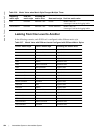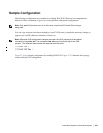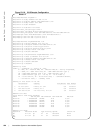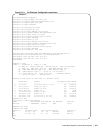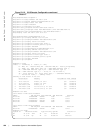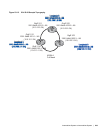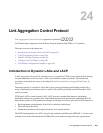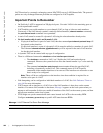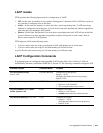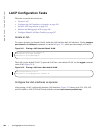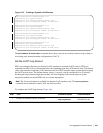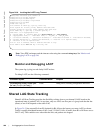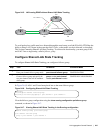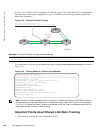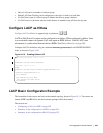
542 | Link Aggregation Control Protocol
www.dell.com | support.dell.com
LACP functions by constantly exchanging custom MAC PDUs across LAN Ethernet links. The protocol
packets are only exchanged between ports that are configured as LACP capable.
Important Points to Remember
• On ExaScale, LACP is supported on 200 physical ports. Use static LAGs for the remaining ports to
avoid unpredictable results.
• LACP enables you to add members to a port channel (LAG) as long as it has no static members.
Conversely, if the LAG already contains a statically defined member (
channel-member command),
the
port-channel mode command is not permitted.
• A static LAG cannot be created if a dynamic LAG using the selected number already exists.
• No dual membership in static and dynamic LAGs:
• If a physical interface is a part of a static LAG, then the command
port-channel-protocol lacp will
be rejected on that interface.
• If a physical interface is a part of a dynamic LAG, it cannot be added as a member of a static LAG.
The command
channel-member gigabitethernet x/y will be rejected in the static LAG interface
for that physical interface.
• A dynamic LAG can be created with any type of configuration.
• There is a difference between the
shutdown and no interface port-channel:
— The
shutdown command on LAG “xyz” disables the LAG and retains the user
commands. However, the system does not allow the channel number “xyz” to be statically
created.
— The command
no interface port-channel channel-number deletes the specified LAG,
including a dynamically created LAG. This command causes all LACP-specific
commands on the member interfaces to be removed. The interfaces are restored to a state
that is ready to be configured.
Note: There will be no configuration on the interface since that condition is required for an
interface to be part of a LAG
.
• Link dampening can be configured on individual members of a LAG. See Link Debounce Timer on
page 446 for more information.
• LACP cannot add an interface to a LAG if one of the LAG members is shut down on the remote
interface. If a remote LAG member is shut down, Message 1 appears on the local system when you
attempt to add a member. In this case, enable all members of the LAG on the remote system, and then
add any new members on the local system.
• FTOS might not synch connected and static routes learned via LACP to the secondary RPM.
Configure
redundancy protocol lacp to synch LACP states between RPMs.
Message 1 LACP Remote Port Down Error Message
% Error: This port property does not match with other LAG member.



